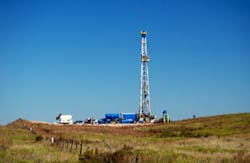Companies required to disclose chemicals used in fracking on federal lands
Companies that drill for oil and natural gas on public and American Indian lands across the United States will soon have to disclose the chemicals they use in hydraulic fracturing.
A final rule set to take effect in June also updates requirements for well integrity and the disposal of wastewater from fracking activities. The aim of the "commonsense standards" is to improve safety and help protect groundwater, the Interior Department said.
"Current federal well-drilling regulations are more than 30 years old and they simply have not kept pace with the technical complexities of today's hydraulic fracturing operations," explained Secretary of the Interior Sally Jewell. "This updated and strengthened rule provides a framework of safeguards and disclosure protocols that will allow for the continued responsible development of our federal oil and gas resources. As we continue to offer millions of acres of public lands for conventional and renewable energy production, it is absolutely critical the public have confidence that transparent and effective safety and environmental protections are in place."
Under the regulation, operators will have to publicly disclose chemicals used in hydraulic fracturing to the Bureau of Land Management through the website FracFocus, within 30 days of completing fracturing operations.
The industry was quick to respond to the new rule. The Independent Petroleum Association of America and the Western Energy Alliance filed a lawsuit seeking to block the rule, and the American Petroleum Institute argued that it "imposes new costs and delays on energy development without improving on existing state and federal regulations".
The U.S. public, meanwhile, remains divided on the issue of fracking. A recent survey by Gallup found that 40 percent of Americans are in favor of the procedure and 40 percent oppose it, while a substantial 19% do not have an opinion. Support for fracking was highest among older Americans and Republicans.
The research firm commented that, as the debate continues, it will be interesting to see if one point of view begins to gain the upper hand.
